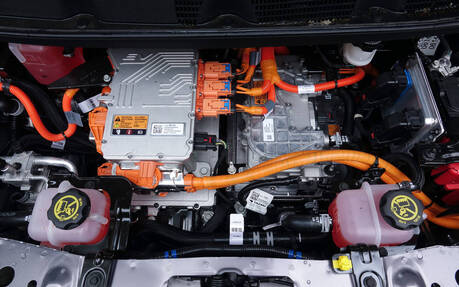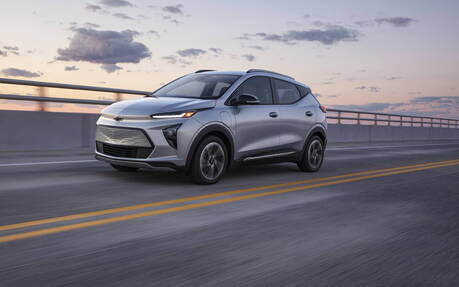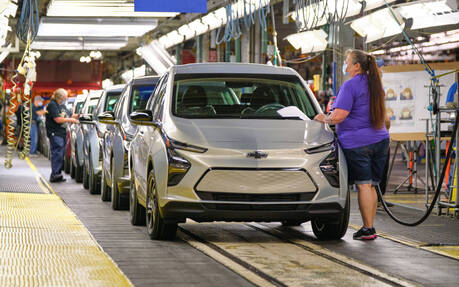We thought we were done with battery problems Chevrolet Bolt. Unfortunately, this is far from the case, since many owners of this model have had to change the battery, and often on new models of the product. Others have seen this problem appear during the delivery of their car, even though it had not yet left the dealer…
On the Chevrolet Facebook group Buy an EV / EUV In Quebec, information sharing is very rich. Owners mention that they had to change their batteries twice, on cars with only a few thousand kilometers on the odometer… And be careful, this is not a recall question for the preventive battery that was launched in 2021 by General Motors about a small fire. dangerous. Rather, it is a defect associated with the difference in load or even the impossibility of restoring the vehicle.
Bourgeois Chevrolet of Rawdon has replaced 68 Bolt EV/EUV batteries since June 1, 2023. Specializing in electrification, this sale alone includes a good sample of the range of problems, having delivered no less than 570 Bolts in 2023, or 6 % of all varieties sold in the state. Several batteries on the all-new 2023 models were replaced, even before the vehicles were delivered to customers.
Photo: General Motors
However, the problem occurs on 2020 to 2022 models and on 2023 vehicles, which are brand new. At Paillé GM, around ten 2023 Bolts are currently awaiting battery transplants. Racine Chevrolet of Saint-Jean-sur-Richelieu also admits that the problem is serious and that consumers are frustrated, especially because of the delay in getting another battery…
In short, these are not isolated cases. Businessmen realize that there is a big problem. But which one? Because the most interesting thing is that the traders do not do a thorough investigation. If you have a problem with the car, you plug an electronic reader into the car’s OBD-II port to find different codes. Technicians are then asked to call the General Motors technical line where they will receive approval to install a new battery, which will be automatically ordered. However, at the dealer, they never told me what the root of the problem was. Is this really related to an unbalanced battery cell charge? For the internal electronic module? Or even a software error?

Photo: Marc Lachapelle
In this regard, traders agree that there is something fishy under the rock. Because in most cases, changing the battery does not solve the situation. Getting to the point where we question the importance of this step instead of digging deeper into electronic reprogramming. So it would be impossible for GM to “turn off” the issue by routinely replacing the battery, when the problem may not be of this nature. Additionally, the error codes listed vary from one diagnosis to another, although they are never accompanied by an explanation to dealers.
Currently, it takes about four to six weeks to get a replacement battery from General Motors. A deadline that is not always convenient for merchants, who do not have many Bolts on hand to lend to their customers. A shame as consumers paying for the Bolt often don’t want to find themselves behind the wheel of a Chevrolet Equinox that will have to put gas on it.

Photo: General Motors
As a Bolt EV owner myself, I’m worried. Not because it can fail in the short or medium term, but because of the long life of its battery which, out of warranty, can cost more than $20,000 to replace. So is it a risky bet to keep it long term? The question deserves to be asked. However, the biggest concern in my opinion is GM’s inability to fix the problem, even though the car has been on the market since the summer of 2016.
Indeed, the recall announced in June 2023 on several Bolt EV/EUVs sold locally (not including mine) included reducing the possibility of charging the battery to 80%, thus limiting the range to around 320-330 km instead of 400-410. . Another disappointment for many users, who had chosen this model precisely because of the price / freedom ratio.
Now, if GM still hasn’t mastered the Bolt’s electric technology after seven years on the market, what will happen to the plethora of new models arriving in the coming months? Already think Cadillac Lyriq and Chevrolet Blazer EV whose sales have begun (not without serious problems), but also to Equinox EV, Cadillac Celestiqfor the future Chevrolet Bolt, and also for the set Silverado/Sierra EV and the Cadillac Escalade IQ.

Should we be concerned about their technology and perhaps hold off on purchasing these vehicles until their reliability is proven? To ask a question is to answer it. Because the risk is too great. Look, it was fine for Ford Mustang Mach-E, which all problems are not yet understood. And if we have to worry about the reliability of GM’s new electric products, we have to worry about that of Honda Prelude and Acura ZDX – sharing General Motors technology – and which will arrive here in late spring.
One thing is for sure, the Chevrolet Bolt represents a big problem for General Motors. Not to mention having a major recall launched in 2021, it quickly found itself on the losing streak. And although production has stopped for a few weeks, many owners will need more detailed answers. This is the case of André Gamelin, owner of Peintures d’Auto Super, who bought 14 Bolt EUVs in 2023 intended for deployment. Two of them had to have the batteries replaced, which was expensive considering these vehicles are work tools that haven’t been driven for weeks.
And since they average between 1,000 and 1,200 kilometers a week, he may soon find himself with out-of-warranty vehicles that will be very expensive to repair if a battery problem occurs. So even if for GM the Bolt is a story to forget, it will haunt them for a long time to come.

























